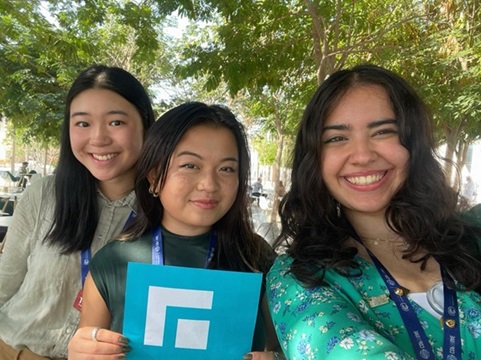
Annabelle Liao, a student in LFS’ Global Resource Systems, attended Week 1 of COP28 in Dubai, UAE, from Nov. 30-Dec. 6, 2023. She was among more than 70,000 people who attended COP28 (Conference of the Parties to the United Nations Framework Convention on Climate Change) where attendees had the chance to meet people from around the world, and discuss corrective action to address the climate crisis. Liao shared her concerns, inspirations, and opinions of the event with the Faculty of Land and Food Systems:
You attended COP28 in Dubai on behalf of ClimaTalk, a youth-led organization that aims to empower young people who are working towards climate action. What were your goals and expectations in attending?
Ahead of attending I had two scopes of work in mind: first, to interview as many youth activists and leaders as possible and amplify the work that brought them to COP28 (which would be processed into video reels for ClimaTalk’s social media), and secondly, to attend as many negotiations and events as possible to contribute to the release of the daily thematic briefs. These were my goals, and I’m glad that I can look back on my week in Dubai and be assured that I gave as much time and energy as I could towards maximizing my COP28 experience not only for myself but also for my community and youth back home. In terms of expectations, because I am naturally an optimist I really thought that this could be the course-correction COP desperately needed by the world. Needless to say, you can imagine my extreme letdown.
How did you prepare for COP28?
Preparing for COP28 was one of the most daunting things I have ever tasked myself with – a common sentiment among all delegates is that you can prepare forever and still feel woefully unready when you get to the conference! I received confirmation that I would be attending as an Observer in early October, and from then on until December it was a whirlwind. Because I was on ClimaTalk’s COP28 Project Team, a lot of my work involved creating digestible resources that simplified international proceedings and climate policy (for example, I co-created the ABCs of Climate COPs!), and this really enhanced my own knowledge of what COP meant. I also happened to be on an exchange semester at the National University of Singapore last semester, and one of my professors connected me to a researcher who has attended and organized many delegations for the university; she invited me to attend the preparatory briefings and panels meant for the university’s own delegation which I’m super grateful for, and I learned lots there! However, one of the most helpful ways to prepare in my opinion is to read the news. Staying up to date on different nations’ goals for the conference, different industries’ stake in the climate, the objectives of COP28, and especially tentative policy or financial commitments really helped me set the stage ahead of attending. Understanding what is happening in the world gets you far at COP.
See the full interview at the Faculty of Land and Food Systems website.
Through Strategy 3: Thriving Communities, UBC is committed to supporting the ongoing development of sustainable, healthy and connected campuses and communities.